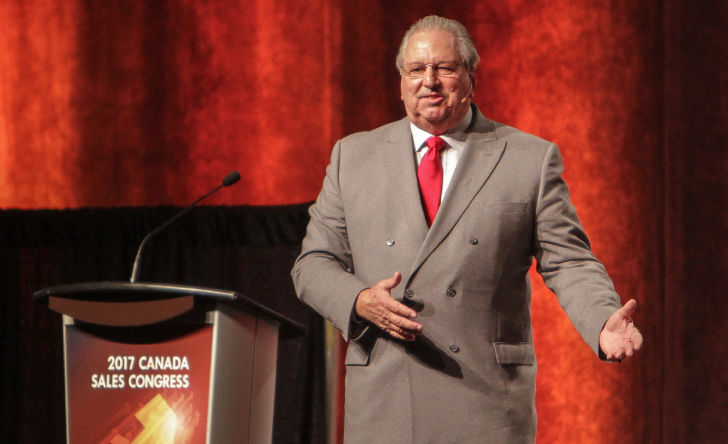Van Mueller’s kind of success in the business could make one assume that he has always overflowed with confidence. The Wisconsin-based insurance icon qualified for MDRT’s Top of the Table in April for the 27th year in a row and he has 30-50 client appointments a week. But he told the Canada Sales Congress held in May that he was a terrible life insurance agent when he first started out despite receiving mentoring from some of the biggest names in the field.
“For the first 16 years I was in the business I was such a lousy insurance agent, that I’m pretty sure I’m the reason there’s compliance,” Mueller mused.
But he managed to turn around his business to the success he is today with one major learned skill: he knows how to ask questions, which puts the spotlight on the client, not him.
“The less there is about me and the more there is about my customers, the more successful I became. [With] simplification, not complication, the bigger the sales I had.”
Rehearse to improve
Mueller said most advisors practice their hobbies more than they practice their roles as financial advisors. And he suggested to the 1,200 insurance specialists attending the one-day conference that they rehearse asking questions to make them sound more conversational as opposed to a sales pitch, saying it will dramatically change their careers.
“The easiest way that I have learned to build self-esteem in myself, the fastest way to do it, is to do something for somebody else.”
Mueller said he has signed up many clients who have told him that he inspired them to take action by asking the questions no other advisor had ever posed before. In doing so, he said he became instantly referable.
“There’s no such thing in our business as asking for referrals. It’s the biggest lie in the history of our business. The way to get referrals is by becoming referable. And the way you become referable is by asking people something nobody has ever asked them.”
He said he poses powerful and intriguing questions so as not to sell a client a product, but rather the concept that they can be in control of their financial futures. “That’s what they buy. They don’t buy policies.”
He suggested one way of doing this is to point out to clients that although it may be good that they’re living longer, there is increasing concern that neither the client nor the government will have the money to take care of them.
Mueller asks his clients: “Do you want to be rich or do you want to have an absolute, positive guarantee that you will never be poor? The clients always say: ‘I want a guarantee that I will never be poor.’ What if I can show you a way that should you completely run out of money you would never run out of income? In these uncertain times, that is the most important information you will get your hands on.”
Asking questions is also the way Tom Hegna, an Arizona advisor, author and speaker, said financial advisors will succeed.
Tell stories
The retirement income expert and author of four books said insurance is not a knowledge business – rather, he said, it is a language and a stories business. “You want to increase your production? Work on your words, work on your questions, work on your stories.”
And even then, pick and choose your words, so you’re not the one doing the talking all the time. “Don’t talk so much – telling is not selling, listening is selling; asking questions is selling. What they say is way more important than what you say.”
Hegna provided some words of guidance to the financial advisors about what he points out to his retiree clients:
- Cover your basic expenses with guaranteed lifetime income with an annuity that will cover all sorts of risk, including longevity, deflation and market risk.
- Optimize by laddering guaranteed income.
- Have a plan for long-term care insurance because the costs can virtually wipe out a person’s bank account.
- Buying life insurance is one of the most efficient ways of passing on money because it’s non-taxable. Don’t forget to insure the non-working spouse because that person brings a lot to the family. It’s also important to insure children and grandchildren because if they die, it will take the parents a long time to recuperate.
Answering two tearful questions from his young granddaughter reminded Stephen Pustai of why he became involved in the insurance industry.
The Burlington, Ontario-based advisor who is a diamond member of the Million Dollar Round Table Foundation Canada, was set to retire and hand over his clients to his son Rob, when his son died suddenly of a heart attack.
Rob’s young daughter approached him and asked whether she and her mother would still have a home and whether she would be able to go to university now that her father had died.
“I was thankful for the financial principles my son Rob and I share because his forethought allowed me to reassure my beautiful granddaughter that yes, she would suffer from the loss of her father, but she would not have to suffer through the loss of her home or her education. Life insurance allowed Rob to financially prepare his family for life without him.”
More than a career
Pustai, who has been in the business for more than 60 years, said he has seen over the years how beneficial life insurance is to clients.
“The life insurance business is more than just a career for me – it’s an article of faith – how we impact people’s lives for the better.”




